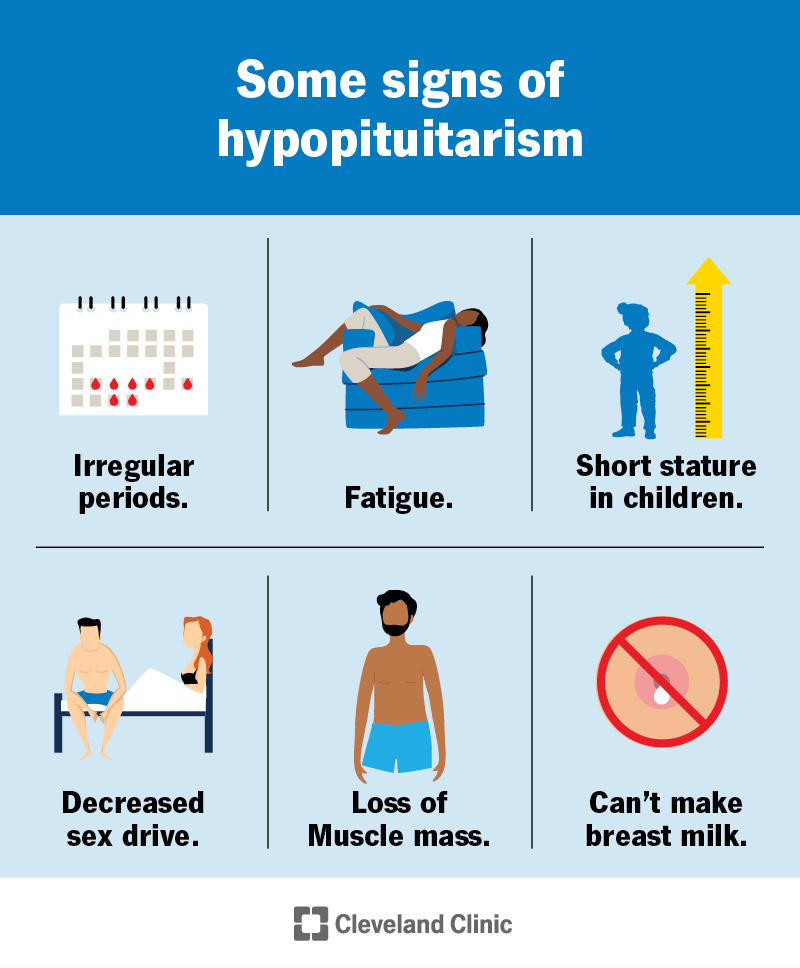Hypopituitarism is a rare condition in which there’s a deficiency of one, multiple or all of the hormones made by your pituitary gland. It happens when there’s a disorder or damage to your pituitary gland or hypothalamus. Symptoms, diagnosis and treatment depend on which hormones are lacking.
Advertisement
Cleveland Clinic is a non-profit academic medical center. Advertising on our site helps support our mission. We do not endorse non-Cleveland Clinic products or services. Policy
Hypopituitarism is a rare condition where your pituitary gland doesn’t make enough of the hormones you need. Hormones are like chemical messages that tell your body what to do. Pituitary hormones control things like metabolism, growth and development, and reproduction.
Advertisement
Cleveland Clinic is a non-profit academic medical center. Advertising on our site helps support our mission. We do not endorse non-Cleveland Clinic products or services. Policy
Your pituitary gland doesn’t act alone. It works together with your hypothalamus. This brain structure tells your pituitary gland to release certain hormones. It also regulates functions like blood pressure, heart rate, body temperature and digestion. If you have a disease or injury that affects your pituitary gland or hypothalamus, you may develop hypopituitarism.
The condition can happen suddenly after an injury or develop slowly over months or years. People with it often need to take medication for the rest of their lives to manage symptoms. Your healthcare provider will watch you closely to make sure you get the right treatment.
There are three different kinds of hypopituitarism based on the number of hormones that are lacking (deficient):
There are three kinds of hypopituitarism based on its cause and how it affects your pituitary gland or hormones:
Advertisement

Image content: This image is available to view online.
View image online (https://my.clevelandclinic.org/-/scassets/images/org/health/articles/22102-hypopituitarism)
The symptoms of hypopituitarism depend on which pituitary hormone(s) is deficient (lacking). The following factors also affect what kind of symptoms you’ll experience:
Symptoms of growth hormone deficiency in newborns include:
Symptoms of growth hormone deficiency in children include:
Symptoms of growth hormone deficiency in adults include:
Symptoms of thyroid-stimulating hormone deficiency in newborns include:
Symptoms of thyroid-stimulating hormone deficiency in children and adults are similar to symptoms of hypothyroidism, an underactive thyroid. This is because TSH stimulates your thyroid to produce its own hormones.
Symptoms of hypothyroidism include:
FSH and LH are hormones called gonadotropins. They affect your reproductive system.
Symptoms of FSH deficiency and/or LH deficiency in newborn boys include:
Symptoms of FSH deficiency and/or LH deficiency in children include:
Symptoms of FSH deficiency and/or LH deficiency in men include:
Symptoms of FSH deficiency and/or LH deficiency in women can include:
Symptoms of ACTH deficiency in newborns include:
Advertisement
Symptoms of ACTH deficiency in children and adults include:
The main symptom of prolactin deficiency is a lack of breast milk production after giving birth.
Symptoms of oxytocin deficiency include:
Symptoms of ADH deficiency in newborns include:
Symptoms of ADH deficiency in children include:
Symptoms of ADH deficiency in adults can include:
Many conditions and situations can cause hypopituitarism. In some cases, healthcare providers can’t determine the cause. In general, these three main factors can cause the condition:
Advertisement
Conditions that can cause pressure on these areas of your brain, possibly leading to hypopituitarism, include:
Examples of situations that can cause pituitary or hypothalamus damage include:
Examples of rare conditions that can cause the condition include:
Advertisement
The following conditions or situations may be risk factors for hypopituitarism:
Hormonal deficiencies that accompany hypopituitarism can lead to the development of other conditions. The exact effects vary depending on which hormone is lacking. Some examples are:
Your healthcare provider may order any of the following tests to diagnose hypopituitarism:
There’s no cure, but hypopituitarism is treatable. Treatment depends on which pituitary hormone(s) are deficient and what caused your condition. Your healthcare team will work with you to customize the right treatment plan. Common treatment options for hypopituitarism include:
Your healthcare provider may recommend a medical ID card (or bracelet) that you always keep with you in case of an emergency.
The outlook varies and depends on the following:
While many people with hypopituitarism lead healthy lives, long-term pituitary damage can lower your life expectancy compared to people without the condition of the same age.
Your life expectancy depends on the hormone deficiency type, its severity and your overall health. People who follow their treatment plans typically don’t have a lower life expectancy.
Although it’s not as common, a sudden and severe onset of hypopituitarism can result in a medical emergency and death if it’s not treated. Be sure to call your healthcare provider or go to the nearest emergency room if you’re experiencing symptoms.
In most cases, hypopituitarism requires close, lifelong monitoring of the hormones affected. Be sure to see your healthcare provider regularly to make sure your treatment plan is working. If you’re experiencing new or concerning symptoms, contact your healthcare provider as soon as possible.
If you’ve been diagnosed with hypopituitarism, you may want to ask your healthcare provider the following questions:
A new diagnosis can be scary, but don’t be afraid to ask your healthcare provider questions about hypopituitarism. Most cases require lifelong treatment and monitoring of your hormones, so it’s important to see your provider regularly. Be sure to contact your provider if you have new or concerning symptoms. They’re there to help.

Sign up for our Health Essentials emails for expert guidance on nutrition, fitness, sleep, skin care and more.
Learn more about the Health Library and our editorial process.
Cleveland Clinic’s health articles are based on evidence-backed information and review by medical professionals to ensure accuracy, reliability and up-to-date clinical standards.
Cleveland Clinic’s health articles are based on evidence-backed information and review by medical professionals to ensure accuracy, reliability and up-to-date clinical standards.
Hormonal conditions can be tricky to find and complicated to treat. The experts in endocrinology at Cleveland Clinic are here to provide the best care.
